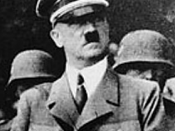During the 1920's and early 1930's Germany was unstable socially, economically and politically. The governments were more often in a state of disarray than not, the population was disillusioned and scared, and the Great Wall Street stock market crash of 1929 saw the economy crumble to an all time low. These unfavourable factors combined to create a nation of precarious stature, a country which was looking for a saviour. This came in the form of fascism, an ideology in which the individual is dominated by an all-powerful state under the control of one supreme leader. The hand to lead the people of Germany out of all the problems and deceptions of these terrible times was Adolf Hitler, fascist dominator. These difficulties gave Hitler and the Nazi party the opportunity to employ their propaganda skills to capture this disenchanted nation and win their hearts, and the German People.
In the mid 1920's Adolf Hitler was the undisputed leader of the Nazi Party.
Much of Hitler's success as a politician during his pilgrimage to higher power in Germany was due to his powerful and dominating personality. A master orator, not only was Hitler a charismatic speaker, but his public speaking was so passionate and dynamic that the crowds would be driven wild with enthusiasm of the ideas he preached. Hitler's oratory often made vague promises while avoiding the details, by using simple catch phrases, repeated over and over. Hitler's dominance and authoritarian nature was a much-needed change for the people of Germany, following the indecisive and so often unsuccessful muddling of the Weimar government and its predecessors. Hitler's use of aggressive propaganda and use of his terror campaign in the people; however it was not the only reason. The Weimar government becoming weak was a major factor in Hitler's rise to...



Rise of Adolf Hitler
You've written an interesting historical essay on the events which led up to Hitler seizing power in Germany. I disagree that Hitler had excellent leadership skills. Rather, he had the single mindedness of a madman who saw no other way than his distorted vision. His "excellent leadership skills" led Germany to ruin by 1945. Hopefully, the strange confluence of events which led to the rise of such a tyrant will not be repeated and we must constantly be vigilant to ensure that nobody is again able to cause the death and destruction which comprise Hitler's lasting legacy. Although I disagree wtih certain parts of your essay, I am still going to give it a good rating.
6 out of 6 people found this comment useful.